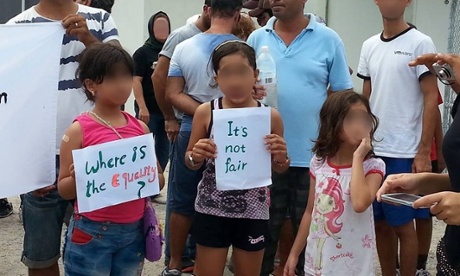During interrogation by UN committee against torture, Australia promises ‘within months all but a few children will be out of detention’

The Australian government says asylum seekers in offshore detention receive healthcare “comparable to that in Australia” but that Papua New Guinea and Nauru are legally responsible for their welfare.
And it has promised that “within months all but a few children will be out of detention”.
At its second day before the UN committee against torture, Australia was again subjected to a wide-ranging interrogation and forced to defend its policies of “enhanced screening”, mandatory detention and offshore processing of asylum seekers.
The committee monitors adherence by signatories to the convention against torture and other cruel, inhuman or degrading treatment or punishment.
The healthcare of asylum seekers on PNG’s Manus Island has been under particular scrutiny after the deaths of two men this year.
Reza Berati was beaten to death during a riot between detainees and guards in February. In August, Hamid Kehazaei died after a cut foot became severely infected. He died in hospital after several days on life support and concerns have been raised there were delays in his care.
“Healthcare services are not denied to asylum seekers,” Mark Cormack, from the Department of Immigration and Border Protection told the committee in Geneva.
“International Health and Medical Services are required to deliver healthcare that is the best available in the circumstances and broadly comparable with the health services within the Australian community.”
Plans to move asylum seeker detainees from the Manus Island detention centre into the community on the island were still active, Cormack said, despite the PNG government announcing last month the deal to resettle refugees was off because of widespread public resistance and that a new agreement would have to be negotiated.
Cormack told the committee PNG’s system for releasing refugees would be in operation soon and that from next month five to six detainees would be released each week. They would then be allowed to find work on Manus.
Cormack said the Australian government was working to have as many children as possible removed from detention, on Nauru and elsewhere, as soon as was practical.
“Within months all but a few children will be out of detention,” he said.
But the Australian delegation told the committee the welfare of detainees held in Australia’s offshore detention centres was the responsibility of the country hosting them.
“Conditions in regional processing centres are a matter for the countries in which those centres are established,” Stephen Bouwhuis from the attorney general’s department said.
On Monday the committee’s chairman, Claudio Grossman, said Australia had “effective control” of detention conditions.
“It is not convincing to claim Australia is not responsible for these people … Australia pays the bills,” he said.
The UN committee also raised numerous concerns about Australia’s practice of screening asylum seekers’ claims for refugee status on board ships.
Wendy Southern from the immigration department said such screenings involved trained officers asking specific questions of asylum seekers – in a language they understood – about their reasons for fleeing.
Claimants who had plausible fears of persecution, consistent with other reports from their country and who belonged to a group known to face persecution were “screened in”.
People who made economic claims or who could not cite a specific harm or whose fear of persecution was historic and not current, were “screened out” and sent home.
Last month in the high court it was revealed that when Australia forcibly detained 157 Tamil asylum seekers at sea for a month, officers asked no questions about why people left Sri Lanka, whether they faced persecution at home or where they wanted to go.
The asylum seekers were not “informed of any matter concerning [their] detention or movement; provided with any opportunity to be heard on any matter concerning [their] detention or movement”.
On people being returned to torture, Southern said the Australian government was “aware of unsubstantiated reported of the mistreatment of people returned”.
She said it was not general practice for Australia to monitor the welfare of people it had sent back to their home countries but that allegations of persecution “are taken very seriously and followed up where we can”.
The first Afghan Hazara sent back to Afghanistan, Zainullah Naseri who was forcibly deported in August, was kidnapped by the Taliban and tortured for three days for a ransom before he escaped.
He has since been interviewed by Australian embassy staff in Kabul, but he remains in hiding in the Afghan capital.
Senate estimates heard last month there had been eight reported cases of Sri Lankan Tamil asylum seekers being persecuted after being returned.
The government says it has found at least four of those cases to be unsubstantiated.
Sophie Nicolle from Amnesty International Australia said the government’s response to the committee on asylum policy was a “B-grade attempt to explain away” flagrant breaches of international law.
“On everything from offshore detention conditions to complementary protection, they dodged the committee’s questions and attempted to deny the obvious: that the Australian government is responsible for multiple serious violations of international law which are causing immense suffering to people seeking our protection.”
The committee against torture will hand down its report on Australia on 28 November.
